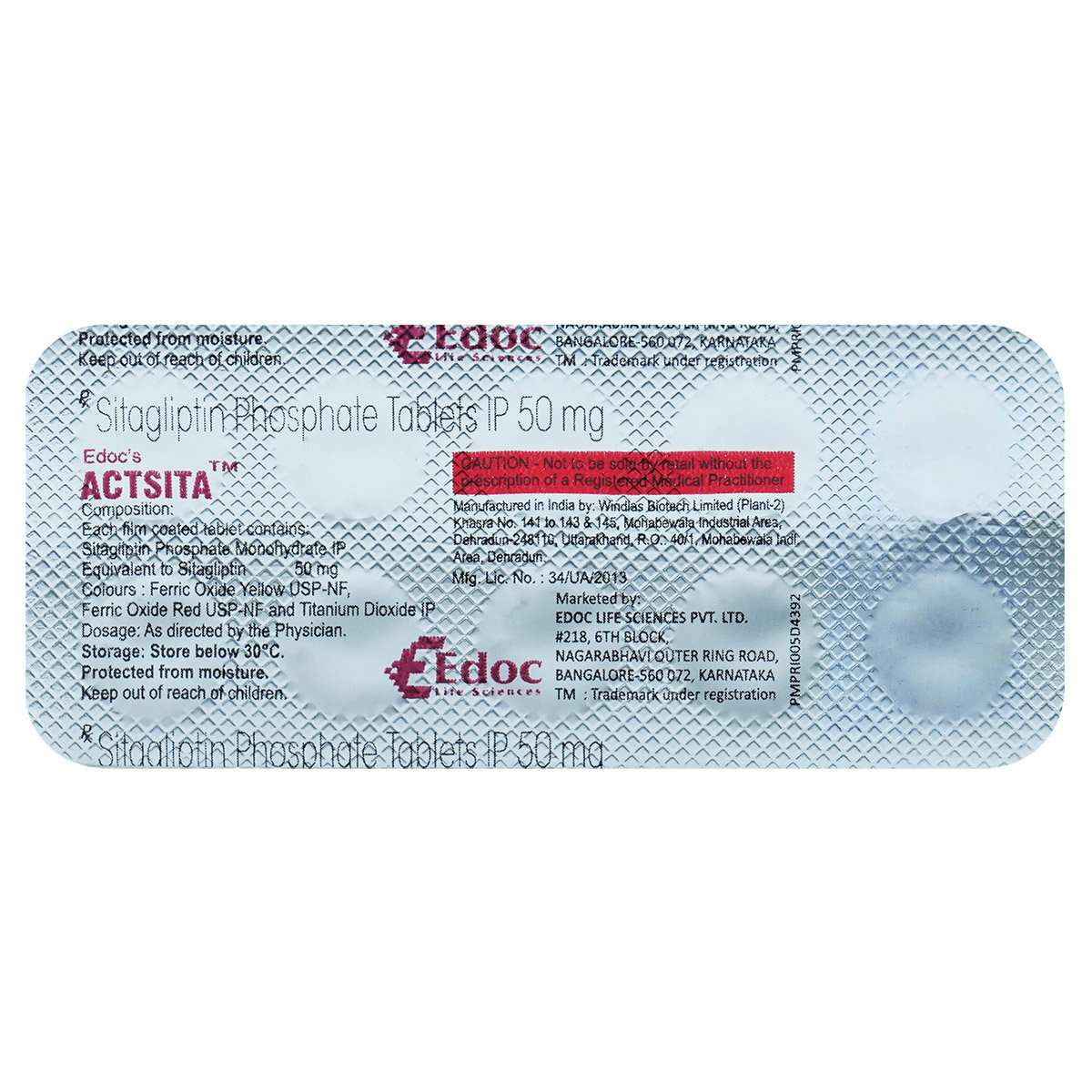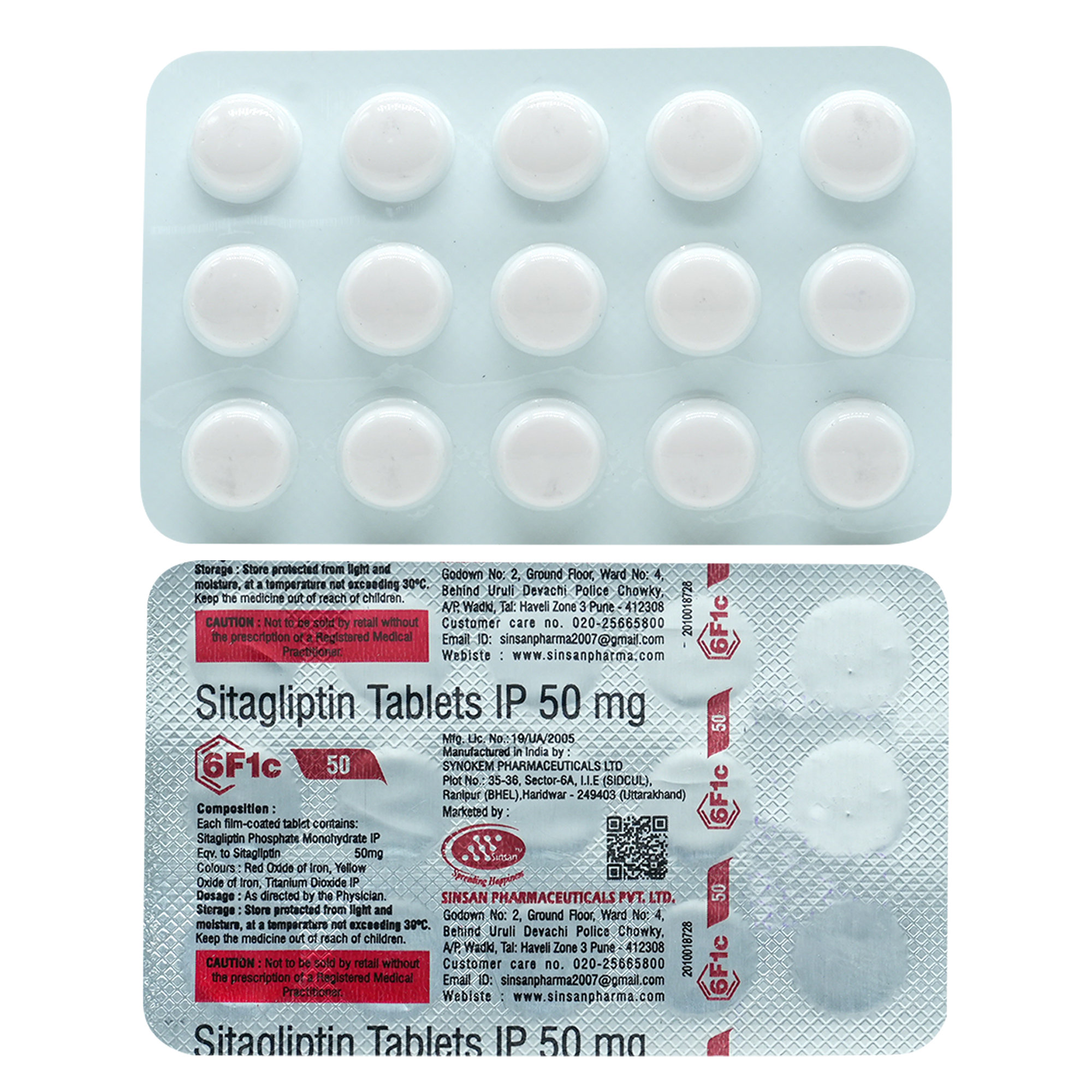Sitagliptin
About Sitagliptin
Sitagliptin belongs to the group of anti-diabetic medicines called DPP-4 inhibitors (dipeptidyl peptidase-4 inhibitors) used to treat type-2 diabetes mellitus. Type 2 diabetes mellitus is a condition in which blood sugar is too high because the body does not produce or use insulin normally.
Sitagliptin contains Sitagliptin, which works by blocking the action of DPP-4 (dipeptidyl peptidase-4) and increasing the amount of insulin made by the body. Thus, it helps lower blood glucose levels.
In some cases, Sitagliptin may cause side effects such as upper respiratory tract infections, headache, and nasopharyngitis (inflammation of the nasal passages). Most of these side effects may not require medical attention and resolve gradually over time. However, you are advised to consult the doctor if any side effects persist or worsen.
Do not take Sitagliptin if you are allergic to any of its components. Consult the doctor if you are pregnant or breastfeeding. Sitagliptin is not recommended for children below 18 years. Keep your doctor informed about your health condition and medications to rule out any unpleasant side effects/interactions.
Uses of Sitagliptin
Sitagliptin is used in the treatment of type 2 diabetes mellitus. The detailed uses of Sitagliptin are as follows:
- Type 2 Diabetes Management: Sitagliptin is used alongside diet and exercise to regulate blood sugar.
- Improved Insulin Response: Sitagliptin enhances insulin production and reduces glucose levels.
Medicinal Benefits
- Sitagliptin contains Sitagliptin, a DPP-4 (dipeptidyl peptidase-4) inhibitor used in the management of type 2 diabetes mellitus.
- It is typically prescribed as an adjunct to diet and exercise to improve blood sugar control in adults.
- It increases insulin production by the pancreas, especially after meals, to better regulate blood sugar spikes.
- Reduces the secretion of glucagon, a hormone that raises blood sugar levels, thereby helping maintain better glucose balance.
- When used with diet and exercise, it helps in maintaining consistent blood glucose levels over time.
- Sitagliptin lowers the chances of long-term complications such as diabetic retinopathy (eye damage), nephropathy (kidney damage), and neuropathy (nerve damage) by maintaining stable blood sugar levels.
Directions for Use
- Sitagliptin can be taken with or without food.
- It is usually taken once daily or as prescribed by your doctor.
- Swallow Sitagliptin as a whole with a glass of water.
- Do not crush, chew, or break it.
Storage
Side Effects of Sitagliptin
- Upper respiratory tract infections
- Headache
- Nasopharyngitis (inflammation of the nasal passages)
Drug Warnings
- Do not take Sitagliptin if you are allergic to any of its components.
- Inform your doctor if you have kidney or liver problems, pancreatitis (inflammation of the pancreas), gallstones, type 1 diabetes, diabetic ketoacidosis (a complication of diabetes with high blood sugar, rapid weight loss, nausea or vomiting), a history of alcoholism, heart problems/heart failure, or high blood triglyceride levels.
- Consult your doctor if you are pregnant or breastfeeding.
- Seek medical attention if you experience symptoms of pancreatitis (severe abdominal pain) or heart failure (shortness of breath, swelling in the legs, unusual tiredness).
- Let your doctor know if you are taking any other medicines, including supplements and herbal products.
Drug Interactions
Drug-Drug Interactions: Inform the doctor if you are taking anti-diabetic (insulin glargine), diuretic (furosemide), hormone (levothyroxine), or cardiac glycoside(digoxin).
Drug-Food Interactions: No interactions found/established.
Drug-Disease Interactions: Inform the doctor if you have diabetic ketoacidosis, type-1 diabetes, heart problems, or pancreatitis.
Drug-Drug Interactions Checker List:
Safety Advice

Alcohol
cautionIt is not known if alcohol interacts with Sitagliptin. However, avoid/limit alcohol consumption as it might affect blood sugar levels.

Pregnancy
cautionSitagliptin belongs to pregnancy category B. There are no adequate and well-controlled studies in pregnant women. Please consult your doctor if you are pregnant or planning to become pregnant.

Breast Feeding
cautionSitagliptin should be taken with caution if you are breastfeeding. Please consult your doctor for more information about using Sitagliptin during lactation.

Driving
cautionThis medicine may cause dizziness and drowsiness. Drive or operate machinery only if you are alert.

Liver
consult your doctorIf you have liver disease, inform your doctor before taking Sitagliptin.

Kidney
cautionDose adjustment may be needed in patients with moderate or severe renal insufficiency. Please consult the doctor if you have kidney problems.

Children
unsafeSitagliptin is not recommended for children below 18 years as the safety and effectiveness have not been established.
Habit Forming
Diet & Lifestyle Advise
- Include fruits, vegetables, whole grains, and beans in your diet.
- Try eating food at regular intervals. Do not skip meals. Also, try not to overeat.
- Maintain a healthy weight by exercising regularly.
- Rest properly.
- Avoid stress by doing meditation or yoga.
- Limit saturated and processed food.
- Stay physically active as it helps manage blood glucose levels.
- Avoid/limit the consumption of alcohol as it may affect blood sugar levels.
Special Advise
- If you are due to undergo any tests or surgery, inform the doctor that you are taking Sitagliptin.
- Regular monitoring of blood sugar levels is advised.
- It is recommended to stay on your prescribed diet and exercise program while taking Sitagliptin.
- Consult the doctor if you have stress, fever, trauma, infection or surgery. The doctor may adjust the dose in such cases.
Patients Concern
Disease/Condition Glossary
Type-2 diabetes mellitus: Type-2 diabetes mellitus, also known as non-insulin-dependent diabetes or adult-onset diabetes, is a chronic or lifelong disease that keeps the body from utilising insulin (a hormone which controls sugar levels in the blood) properly. It is a medical condition in which blood glucose levels are above normal. People with type 2 diabetes either do not produce enough insulin, or the insulin produced cannot perform its function in the body (insulin resistance). Middle-aged or older individuals are most likely to suffer from type 2 diabetes; hence, it is also known as adult-onset diabetes. Type 2 diabetes symptoms include lack of energy, tiredness, frequent urination, excess thirst, dry mouth, blurry vision, constant hunger, weight loss, and itchy skin.
FAQs
Sitagliptin is used to treat type 2 diabetes mellitus. It helps manage blood sugar levels.
Sitagliptin works by increasing the amount of insulin made by the body. Thus, it helps lower blood glucose levels.
Do not stop taking Sitagliptin without consulting your doctor, as it may cause an increase in blood glucose levels. Continue taking Sitagliptin for as long as your doctor has prescribed it to you. Speak with your doctor if you experience any difficulty while taking Sitagliptin.
Some people taking Sitagliptin may develop joint pain that could be severe. Consult the doctor if you have severe joint pain.
Sitagliptin may cause hypoglycaemia (low blood sugar) when taken in combination with other anti-diabetic medications. Talk to the doctor if you experience symptoms of low blood sugar, such as headache, dizziness, sweating, hunger, irritability, confusion, and fast heartbeat.
Eat healthy by including fruits, vegetables and whole grains in your diet. Maintain an active lifestyle by exercising regularly. Manage stress by doing deep breathing or yoga. Avoid smoking and alcohol consumption.
Sitagliptin should be swallowed as a whole with water; do not crush or chew it.
Sitagliptin can be taken during pregnancy only if prescribed by the doctor.
Sitagliptin may not cause weight gain. Maintain proper weight by eating healthy food and exercising regularly.
Sitagliptin may cause kidney problems, sometimes requiring dialysis. The doctor will monitor kidney function before and during treatment with Sitagliptin.
Sitagliptin is indicated as an adjunct to diet and exercise to improve glycemic control in adults with type 2 diabetes mellitus. Therefore, it is important to stay on the diet and exercise recommended by your doctor while taking Sitagliptin.
You may experience hypoglycaemia (low blood sugar) if you take more than the prescribed dose of Sitagliptin. Monitor your blood sugar levels regularly and consult the doctor if you have overdosed.
If you miss a dose of Sitagliptin take it as soon as you remember, However, if it is almost time for the scheduled dose, skip the missed dose and take the next dose at the scheduled time.
Yes, it is safe to take Sitagliptin for the long term if prescribed by the doctor.
You are advised to take Sitagliptin for the duration prescribed by the doctor. As type 2 diabetes is a lifelong condition, Sitagliptin may be prescribed for a longer duration.
Sitagliptin may cause serious side effects like pancreatitis (inflammation of the pancreas), and heart failure. Consult the doctor if you experience severe and persistent pain in the abdomen as it could be a sign of an inflamed pancreas. Seek immediate medical attention if you have signs of heart failure like shortness of breath or trouble breathing, fluid retention, unusually fast increase in weight, and unusual tiredness.
Sitagliptin may cause side effects such as upper respiratory tract infections, headache, and nasopharyngitis (inflammation of nasal passages). Consult the doctor if any side effects persist or worsen.
Avoid using Sitagliptin if you are allergic to any of its components. It should not be used in patients with type 1 diabetes, or pancreatitis.
Sitagliptin may interact with some medicines, hence, let the doctor know if you are taking any other medicines during treatment with Sitagliptin. Particularly, inform the doctor if you are using insulin, digoxin, furosemide or levothyroxine.
Regular monitoring of blood sugar levels is advised. It is recommended to stay on your prescribed diet and exercise program while taking Sitagliptin. Consult the doctor if you have stress, fever, trauma, infection or surgery; the doctor may adjust the dose in such cases.
On prolonged use, Sitagliptin may increase the risk of pancreatitis and kidney problems.




